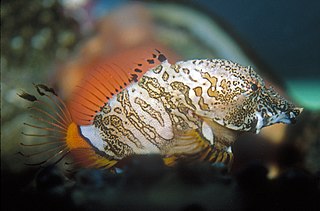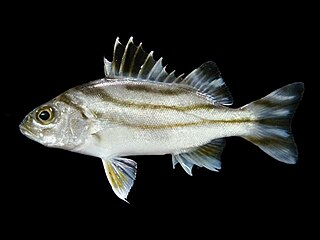
Rhamphocottus is a genus of marine ray-finned fishes belonging to the family Rhamphocottidae. These fishes are known as grunt sculpins. The grunt sculpins are found in the North Pacific Ocean.

Grunters or tigerperches are ray-finned fishes in the family Terapontidae. This family is part of the superfamily Percoidea of the order Perciformes.

Haemulidae is a family of fishes in the order Perciformes known commonly as grunts. It is made up of the two subfamilies Haemulinae (grunters) and Plectorhynchinae (sweetlips), which in turn contain about 133 species in 19 genera. These fish are found in tropical fresh, brackish, and salt waters around the world. They are bottom-feeding predators, and named for the ability of Haemulinae to produce sound by grinding their teeth. They also engage in mutualistic relationship with cleaner gobies of genus Elacatinus, allowing them to feed on ectoparasites on their bodies.

Anisotremus is a genus of grunts native to the eastern Pacific and western Atlantic Oceans. The name of this genus is compound of anisto meaning “different” and tremus meaning “hole”, referring to the different sized paired pores on each side of the head.
Pingalla is a genus of freshwater fish in the family Terapontidae. These fish are native to northern Australia, but one species is also known from New Guinea.

Conodon is a genus of grunts native to the Pacific and Atlantic coasts of the Americas. The currently recognized species in this genus are:

The yellowtail trumpeter is a common species of coastal marine fish of the grunter family, Terapontidae. The yellowtail trumpeter is native to Australia and Papua New Guinea, ranging from Cape Leeuwin in Western Australia along the north coast to Bowen, Queensland, and along the southern coast of Papua New Guinea.
Variichthys is a genus of freshwater fishes in the family Terapontidae from New Guinea and northern Australia. It was formerly known as Varia, but this name is preoccupied by a genus of moth.

Haemulon is a genus of fish in the grunt family known as the scaled-fin grunts. Most are found in the western Atlantic Ocean, with a few species known from the eastern Pacific Ocean. This genus is considered to be one of the most important fish groups of the coral reefs of Brazil due to its commercial value and crucial ecological role.

The bigeye grunt is a species of marine ray-finned fish, a grunt belonging to the family Haemulidae. It is native to the Atlantic coast of Africa.
Haemulopsis is a genus of marine ray-finned fish, grunts belonging to the family Haemulidae. They are native to the western Atlantic Ocean and, mainly, to the eastern Pacific Ocean.

Orthopristis is a genus of marine ray-finned fish, grunts belonging to family Haemulidae. They are found in the Atlantic and Pacific coasts of the Americas.

Parapristipoma is a genus of marine ray-finned fish, sweetlips belonging to the subfamily Plectorhinchinae of the family Haemulidae. The species within the genus are native to the eastern Atlantic Ocean and the western Pacific Ocean.

Pomadasys is a genus of grunts native to the waters of the eastern Atlantic Ocean and through the Indian Ocean to the Pacific coast of the Americas. The name of this genus is a compound of poma meaning "lid" or "covering" and dasys meaning "rough", a reference to the serrated preopercle.

Xenistius is a genus of grunts native to the eastern Pacific Ocean.

Hephaestus is a genus of freshwater ray-finned fish, grunters from the family Terapontidae.

Brachygenys is a genus of marine ray-finned fish, grunts belonging to the family Haemulidae. The species within the genus are found in the eastern Pacific Ocean and western Atlantic Ocean. It is not yet recognised by Fishbase but is by the Catalog of Fishes.
Rhencus is a genus of marine ray-finned fish, grunts belonging to the family Haemulidae. The species within the genus are found in the eastern Pacific Ocean. It is not yet recognised by Fishbase but is by the Catalog of Fishes.

Rhonciscus is a genus of marine ray-finned fish, grunts belonging to the family Haemulidae. The species within the genus are found in the eastern Pacific and western Atlantic Ocean. It is not yet recognised by Fishbase but is by the Catalog of Fishes.
The tiger grunter is a freshwater species of ray-finned fish within the family Terapontidae. The species inhabits rivers in Papea New Guinea, mainly the Fly, Morehead and Bensbach River systems, and can grow to a length of 15 centimeters.















